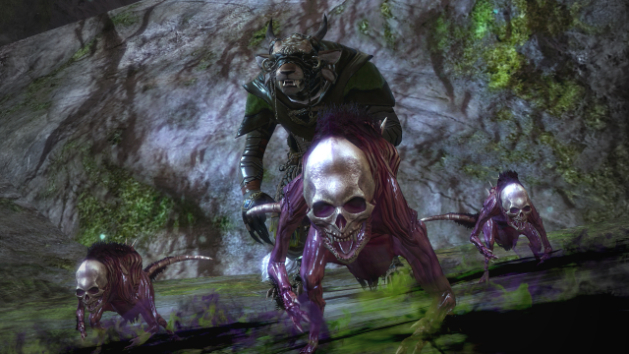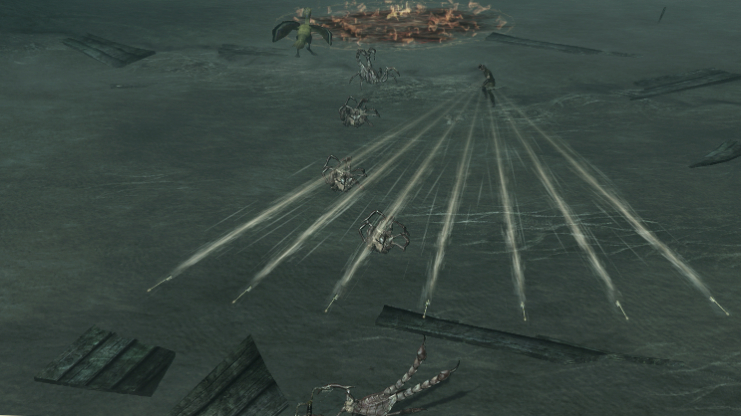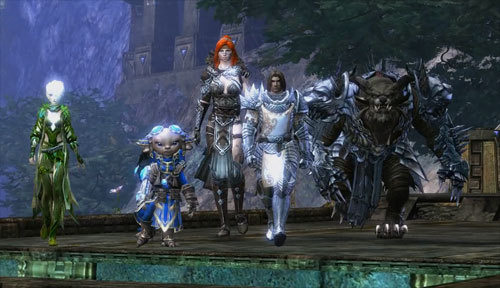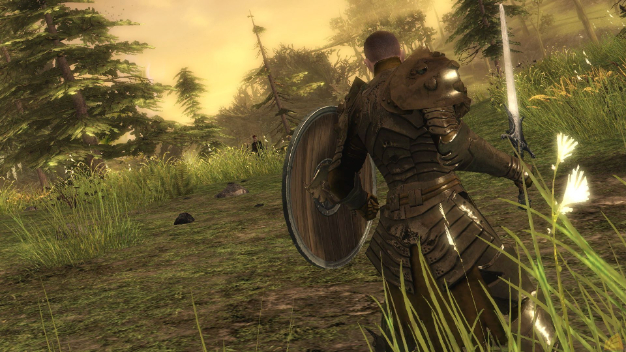To begin this final part of my Guild Wars 2 review, the first thing I’m going to do is cast any comparisons to World of Warcraft straight out of my choice of content. No-one’s interested in hearing about the next WoW-killer, it’s been said about
 almost every single MMORPG to come out after World of Warcraft, and it has wrongly been established as the benchmark for the genre. Guild Wars 2 is, for the most part, completely free to play and so it’s irrelevant to enter it into the paid MMO running. From this point onwards, there will be no mention of World of Warcraft. Let’s just establish that now.
almost every single MMORPG to come out after World of Warcraft, and it has wrongly been established as the benchmark for the genre. Guild Wars 2 is, for the most part, completely free to play and so it’s irrelevant to enter it into the paid MMO running. From this point onwards, there will be no mention of World of Warcraft. Let’s just establish that now.
So where Guild Wars 2 really draws inspiration from Runescape –
Nope. Let’s have none of that, either.
The first and biggest issue we need to get out of the way in this half of the review is simply this – the game isn’t truly free to play. If you want to spend real cash, you can buy gems which you can then exchange within an interface called The Black Lion trading company to buy vanity equipment, crafting supplies, experience boosts and a host of other consumables that can give you a significant advantage in-game. It’s not even possible to ignore it, because it’s thrust in your face all of the time – plus, seeing other characters run around the rich, intricately detailed fantasy world in aviator sunglasses and baseball hats is just plain weird. It doesn’t seem quirky or even lazily shoehorned into Tyria, it just looks like someone dropped it in there and stopped thinking about it until the money came pouring in. This might seem like a trivial complaint, and one could argue that you don’t need to buy the vanity items, but  seeing a towering Viking warrior wearing sunglasses makes the game look odd instead of immersive. Surely they could have imagined some infinitely cooler fantasy vanity items before just slapping shades and baseball caps on everyone? It feels a little bit obnoxious to say the least. Perhaps underneath the logo there’s a little motto reading “He who pays, wins”.
seeing a towering Viking warrior wearing sunglasses makes the game look odd instead of immersive. Surely they could have imagined some infinitely cooler fantasy vanity items before just slapping shades and baseball caps on everyone? It feels a little bit obnoxious to say the least. Perhaps underneath the logo there’s a little motto reading “He who pays, wins”.
Thankfully, the fake free-to-play model ends there. You don’t need to spend any money to unlock in-game features, and you can pay to get a significant advantage in PvP, but from my experiences with the game very few do. Sure, if you want to buy your way through the game, you can, but it doesn’t seem like the majority of players are doing so. It’s hard to see the point in paying to win when you gain experience from everything you do anyway, be it exploration, crafting, or fighting. You can do what you want for as long as you want and not feel obliged to grind quests in order to progress. The PvP in itself is fun to play because everyone’s scaled down to a fair level depending on which area you’re in – you’re not going to get massacred by someone forty levels higher than you in any occasion. It comes down to skill rather than grinding, and a mastery of the GW2 combat system. The best way to explain it is a sort  of fusion of the traditional MMO interface and the Torchlight/Diablo 3 hack and slash feel with the possibility to unlock and combine a huge amount of skills. The fact that weapon skills are unlocked by using the weapon is an excellent touch, though those who prefer a more traditional approach to talents might not approve of it as much. It allows you a great degree of flexibility, especially in multiplayer, swapping between a great hammer and a sword of shield to act as DPS or damage pull when you need to.
of fusion of the traditional MMO interface and the Torchlight/Diablo 3 hack and slash feel with the possibility to unlock and combine a huge amount of skills. The fact that weapon skills are unlocked by using the weapon is an excellent touch, though those who prefer a more traditional approach to talents might not approve of it as much. It allows you a great degree of flexibility, especially in multiplayer, swapping between a great hammer and a sword of shield to act as DPS or damage pull when you need to.
That’s right, falling into traditional combat roles has been completely discarded in Guild Wars 2 – you’ll be expected to multitask and most of the time you won’t be able to get away with just relying on your favourite combinations. You’ll have to experiment, pick up the slack when a party member dies, and carefully time your special attacks to succeed. Everyone can revive a dead player just by clicking on them, but it takes time, and it’s easy enough for everyone to end up dead because one player was feeling too charitable. You have to play by ear rather than solely stick to tanking or healing duties – everyone’s capable of pitching in with the right skills and tools. Teamwork is even more vital because of it, and it gets hard to support someone who isn’t doing their part when they should be – no more spamming DPS and getting away with the best loot. It encourages people to work together during instances in such an efficient way, ramping up the difficulty at the same time to keep you on your toes through each of the eight dungeons available. It would be great to have instances available earlier on in the game,  as an introduction to that part of the game, but whether that’s a design choice or just an oversight is a mystery. You can max your level without ever visiting a dungeon, and that’s a little bit strange. You won’t get far on your own, though, and most of the mid/endgame content is hard to solo – you’ll have to be prepared to get your hands dirty with other players to experience Guild Wars 2 to the fullest.
as an introduction to that part of the game, but whether that’s a design choice or just an oversight is a mystery. You can max your level without ever visiting a dungeon, and that’s a little bit strange. You won’t get far on your own, though, and most of the mid/endgame content is hard to solo – you’ll have to be prepared to get your hands dirty with other players to experience Guild Wars 2 to the fullest.
The same thing applies to the quest instances. If you’re given a big mob to kill, you’ll be instanced when you approach the area it’s lurking in. This stops your progression from affecting anyone else’s, and makes teamwork an essential aspect of the game. That goes for when you’re just roaming the world, too – you’ll constantly be updated on events and brawls going on in the area that you can go and help out with for your share of the spoils. This is not an MMO for the unsociable. It’s a shame that parties are currently limited to five members – there are no epic twenty-man raids as of yet, despite the big world battles working so well.
So there’s a bit of a pay wall hiding in there somewhere, but everything is balanced superbly and no-one’s going to get in your way when you’re too low-level to properly fight back. You’re given a great deal of freedom to level how you want, and aside from the baseball caps and sunglasses, the game is pretty immersive. The story-telling is on a much grander scale than MMOs are used to, to the extent that you can forgive some dodgy voice acting. If you want to play an MMO set in a huge, persistent world, look no further, but Guild Wars 2 still clings on to some of the silly things the genre can’t quite let go of, and the irritating presence alone of the pay-to-win model keeps it from achieving what is obviously some tremendous potential.
Disclaimer:All scores given within our reviews are based on the artist’s personal opinion; this should in no way impede your decision to purchase the game.









You must be logged in to post a comment.